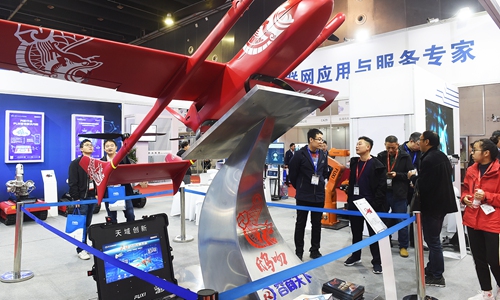
Visitors check intelligent fire-fighting drones at the Yiwu International Intelligent Manufacturing Equipment Expo in Yiwu, East China's Zhejiang Province on December 26, 2019. The expo has attracted more than 500 enterprises from China and abroad to display their latest intelligent products. (Photo: VCG)
China is moving into the second round of major national science and technology projects aiming for 2030, a former government official said on Saturday.
At the fifth China's Manufacturing Power Forum on Saturday, Li Yizhong, former minister of industry and information technology, who is also chairman of the China Federation of Industrial Economics, said that the government has been formulating the medium- and long-term plans for major scientific and technological infrastructure projects for 2030, including quantum communications and artificial intelligence sectors.
China approved the project, called the National Medium- and Long-term Plan for Scientific and Technological Development (2006-2020) in 2006.
According to Li, the 2006-2020 program has had great success with all 17 projects achieving major breakthroughs, of which nuclear power technology and high-speed railways have become the national cards.
"We have made a big step forward in mastering some core technologies," Li said at the event. "Now we are formulating the second round."
Chen Yao, a research fellow at the Institute of Industrial Economics of the Chinese Academy of Social Sciences, told the Global Times on Sunday that the launch of a major science and technology project is significant as it is about reaching the commanding heights of international standards.
"It is all about seizing the commanding heights of scientific and technological standards and gaining technological competitiveness," Chen said. "This is also the goal of our science and technology projects in China, so that the country and most people can benefit."
China's industrialization is 70 or 80 years behind the levels of developed countries. Despite being a latecomer, China has been catching up quickly in recent years, Li noted.
China is now the largest manufacturing country in the world, surpassing the US in 2010, Li said.
In 2018, China's industrial added value exceeded 30 trillion yuan ($4.2 trillion) for the first time, up 6.2 percent year-on-year, continuing to rank first in the world, according to the Ministry of Industry and Information Technology.
"It is expected to grow by 5.6 percent this year, about one-quarter of the world's total, according to Li.


